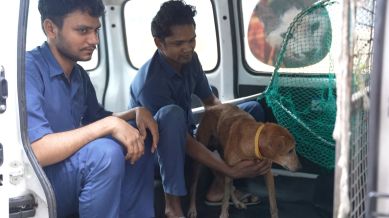Click here to join Express Pune WhatsApp channel and get a curated list of our stories
Where the forgotten heal: inside Pune’s unique hospital where stray dogs get a second chance at life
Karma Foundation, founded by Priya Kailad in 2018, is dedicated to rescuing and treating stray animals, particularly dogs.

Written by Aryesh Chakraborty
When Bella, a street dog, was carried into Karma Foundation, she had already endured unimaginable cruelty: both eyes burned with battery acid. Few believed she could survive. Yet, in the stillness of midnight, surgeons worked against the odds to save her.
monthly limit of free stories.
with an Express account.
Today, Bella is blind, but she is happy. She runs, her tail wagging, following people by scent and sound. Her life is no longer defined by pain, but by resilience, resilience that only unconditional love can nurture.
“The greatness of a nation and its moral progress can be judged by the way its animals are treated,” Mahatma Gandhi once said. In Pune, this philosophy is embodied in the Karma Foundation, an animal hospital where every scar, every wound, and every abandoned life on the streets is given dignity, compassion, and a second chance.
Bella is one of hundreds of animals who find a lifeline at Karma Foundation every year. Founded in 2018 by Priya Kailad, the hospital began as a modest 200 sq ft area. Before founding the organisation, Kailad worked as a child psychologist with a school for children with special needs, where her compassion for the vulnerable took root. Carrying that same empathy forward, she began rescuing distressed animals-dogs, cats, even goats.
“Every day I saw dogs hit by cars, animals bleeding on the streets, and no one stepping forward to help,” Kailad recalls. “The indifference was as painful as the cruelty.” That heartbreak became her determination to build a space where the forgotten could heal.
From that small area, Karma Foundation in Aundh, Pune, has grown into an ably equipped hospital with an operation theatre, ventilator, pathology lab, X-ray unit, and a dedicated team of doctors, surgeons, and animal handlers. But what truly sets it apart is its philosophy- it is not a shelter, but a hospital. “We are not a shelter, we are a hospital. That’s a big difference,” says Kailad. “Our job is to heal and return animals to their homes on the streets, unless they truly cannot survive there.”
The work is relentless, and the struggles are many. Funding is a constant worry, with medical bills mounting for surgeries, treatments, and round-the-clock care. “People expect animal welfare to be free,” Kailad says, “but quality care requires resources, from sterile operating theatres to life-saving equipment.”
The hospital model also allows them to prioritise treatment over long-term housing, ensuring resources are used where they are most needed.
Often, Karma Foundation is unable to admit animals suffering from highly infectious diseases because the hospital lacks specialised isolation wards required for such cases.
“Just like every hospital didn’t have a Covid ward, we too cannot risk other animals’ lives by admitting contagious cases,” Kailad explains.
Difficult decisions have sometimes led to anger and even threats against staff from people who don’t understand the limitations.
Kailad doesn’t only confine herself to rescuing dogs and treating them, but strays of all kinds in Karma’s Care, where pigs, cats, and pedigree pets alike are treated with the same dignity. “Every life deserves professional, sterile, respectful care,” she says. But she knows that dream will only survive if more people stand with her.
Two among many cases at Karma Foundation reveal the stark realities strays face. Sabastin, a black cat, was rescued with ash, threads, and shaved fur- signs Priya suspects of ritual use. He went blind, suffered seizures, and eventually died. In contrast, Shinzo survived after a brutal dog attack tore open her abdomen. “Dogs being abused we see almost daily, but what happened to Sabastin was a bit unusual and deeply unsettling,” Priya noted.
Her approach to animal welfare is grounded in balance. “If you only listen to your heart, you’ll take in every animal and collapse under the weight. If you only use your head, you’ll lose compassion. Real welfare lies in balancing both,” she told The Indian Express.
Still, the foundation cannot survive on compassion alone. Every surgery, every bag of medicine, depends on resources- resources that often run dry. Without steady donations, many animals would simply have no place to go.
So even as the question looms as to how much longer this lifeline can survive for free without the support of the very society it serves, for now, the volunteers are only focusing on their daily aim of serving those animals that people invariably look away from: through stitches that close wounds, hands that comfort the abandoned, and hearts that refuse to look away.
(Aryesh is an intern with The Indian Express)
Click here to join Express Pune WhatsApp channel and get a curated list of our stories